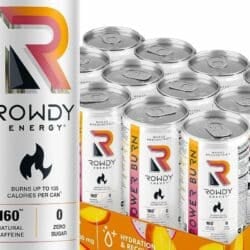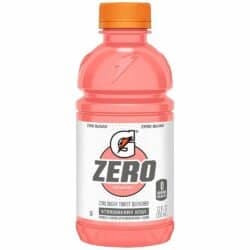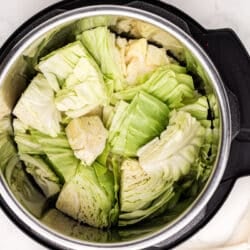Is Powerade Zero Good For You (Nutrition Pros and Cons)?
In this blog post, I’ll review if Powerade Zero is good for you or not? Find out what this product’s nutrition pros and cons are, plus some better options to consider. Generally speaking, Powerade is not a healthy product based on the ingredient label.

Powerade Zero Facts
Powerade Zero is a sports drink manufactured by The Coca-Cola Company.
The company markets it as a hydrating beverage for athletes and active individuals. Powerade Zero is notable for its zero-calorie formulation, making it a low-sugar alternative to traditional sports drinks.
Powerade Zero is available in 12 fl oz, 20 fl oz, and 28 fl oz sizes, and there are several flavors to choose from, including Strawberry Smash, Mixed Berry, Grape, Fruit Punch, and Orange.
Each variant aims to replenish electrolytes without the calories typically found in sugary sports drinks, catering to consumers seeking hydration without added sugars.
Depending on the flavor, Powerade Zero contains various ingredients, including:
- Water
- Citric acid
- Electrolytes
- Modified food starch
- Natural flavors
- Sucralose
- Acesulfame Potassium (artificial sweetener)
- Calcium disodium EDTA
- Ascorbic Acid (Vitamin C)
- Vitamin B3 (Niacinamide)
- Vitamin B6 (Pyridoxine Hydrochloride)
- Vitamin B12 (Cyanocobalamin)
- Artificial colors like Blue 1 and Red 40
One serving of Powerade Zero contains 240-250 mg of sodium, zero sugar, and zero calories; all Powerade bottles are BPA-free and recyclable.
Powerade Zero Ingredients
Let’s examine some of Powerade Zero’s main ingredients and whether they can adversely affect your health. Ultimately, it’s up to you to decide whether this popular sports drink is good for you or not.
Citric Acid
Citric acid is a naturally occurring compound found in citrus fruits. This additive is widely used as a flavor enhancer in numerous food products.
However, the extraction and usage of citric acid in manufacturing are not strictly regulated, which raises concerns about the safety and consistency of production methods in various food and beverage items.
Although citric acid may contribute a pleasant tangy taste, its acidic nature can be corrosive and may lead to dental problems if consumed excessively over a prolonged period.
Red 40
Red 40 is an artificial colorant that contains benzidine, a known human and animal carcinogen.
Even though the FDA considers it safe for consumption in smaller quantities, recent studies link red food dye to bowel disease and raise concerns about its safety as a food ingredient. Additionally, other research explores potential connections between ADHD in children and consuming red food dye.
Scientific research indicates that red food dye, particularly Red 40, may pose significant health risks, including the depletion of essential minerals such as iron and zinc, both vital for physical development.
Red 40 has been linked to chemical changes in the brain and hypersensitivity reactions, potentially causing inflammation and allergic responses. Given these potential risks, it is best to avoid consuming Red 40 or use it cautiously, especially for children.
Sucralose
Although sucralose is about 600 times sweeter than sugar, prolonged consumption of this sweetener can cause adverse health effects.
Despite its FDA approval, some health experts claim that sucralose, an artificial sweetener that undergoes extensive processing and chlorination, is deemed unsuitable for human consumption.
Additionally, sucralose may negatively impact the gut microbiome by reducing beneficial gut bacteria, leading to significant digestive issues.
Health-conscious people may wish to avoid or moderate their sucralose intake to minimize these potential risks.
Natural Flavors
Food labeled with “natural flavors” can create numerous challenges and uncertainties for consumers looking for cleaner ingredients in the food products they purchase.
Unlike terms such as “organic” or “non-GMO,” which have precise regulatory definitions, “natural flavors” lacks a standardized definition and transparency in labeling.
This vagueness allows manufacturers to include a wide array of additives and extracts under the “natural flavors” category, encompassing substances that are not truly natural. They may undergo extensive processing or be chemically altered, even if they’re originally from natural sources.
If you have dietary restrictions or allergies, you might struggle to identify the ingredients or potential allergens in products labeled with “natural flavors.”
Additionally, the term does not ensure nutritional value or health benefits, as these additives can still contribute to processed foods’ overall sugar, sodium, or calorie content. Therefore, if you aim to make informed dietary choices, you may find it challenging to comprehend the true composition and health implications of products containing “natural flavors.”
Modified Food Starch
Modified food starch is a processed ingredient derived from various starch sources like corn, potatoes, or wheat.
It undergoes chemical or physical modifications to alter its properties and improve its functionality in food products.
While the FDA generally recognizes this ingredient as safe, modified food starch can pose health concerns for people with specific dietary restrictions or sensitivities.
Moreover, because it is a processed additive, excessive consumption may cause digestive issues or negatively impact gut health.
Calcium Disodium EDTA
Calcium Disodium EDTA, or ethylenediaminetetraacetic acid, is widely used as a stabilizer and preservative in processed food products, beverages, and personal care products.
This property helps maintain freshness and stability in food products like Powerade Zero by preventing oxidation and discoloration.
However, there are concerns about consuming Calcium Disodium EDTA, particularly its potential to chelate essential minerals such as magnesium, calcium, and zinc from the body, potentially leading to nutrient deficiencies if consumed in large amounts.
Some people may also experience mild digestive disturbances or allergic reactions to EDTA. Therefore, to minimize potential health risks, consuming products containing this additive in moderation and as part of a varied diet is best.
Nutrition Pros
Powerade Zero is a zero-calorie sports drink that provides hydration without adding extra calories, making it attractive to people looking to maintain or lose weight.
The drink is fortified with electrolytes like sodium and potassium, which are essential for replenishing minerals lost during intense physical activity. This helps prevent dehydration and maintain optimal muscle function and athletic performance.
Additionally, Powerade Zero is convenient and readily available in BPA-free and recyclable bottles, making it an option for staying hydrated on the go.
Nutrition Cons
While Powerade Zero provides hydration and electrolyte replenishment, it contains several unhealthy ingredients. The drink contains artificial sweeteners like sucralose, which has been associated with potential health concerns when consumed in large quantities.
Additionally, it includes preservatives and other synthetic ingredients like Blue 1 and Red 40 color dyes, which some studies suggest may have adverse effects on health, including allergic reactions and hyperactivity in children.
Make your own hydrating drink using sparkling water and fresh organic fruit juice as a healthier alternative. This homemade option avoids potential health risks and provides natural flavors and nutrients from the fruit, offering a more wholesome, nutritious, and naturally delicious hydration solution.
Don’t Miss These Sports Drink Reviews
Conclusions
Although Powerade Zero offers hydration, low sugar content, and convenience, it also contains allergens and some unhealthy ingredients, such as artificial sweeteners and color dyes. If you’re health-conscious, you should consider healthier alternatives.
Opting for natural hydration solutions, such as drinks made with sparkling water and fresh organic fruit juice, can provide better nutritional benefits without the potential risks associated with artificial additives.
Don’t forget to join my newsletter list to get exclusive clean eating recipes and tips. The newsletter is 100% free with no spam; unsubscribe anytime.
About the Author: Carrie Forrest has a master’s degree in public health with a specialty in nutrition and is studying to be a holistic nutritionist. She is a top wellness and food blogger with over 5 million annual visitors to her site. Carrie has an incredible story of recovery from chronic illness and is passionate about helping other women transform their health. Send her a message through her contact form.
Note: this post is for informational purposes only and is not intended as medical advice. Please consult your healthcare provider for recommendations related to your individual situation.




















